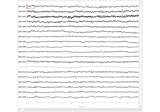mne.set_bipolar_reference#
- mne.set_bipolar_reference(inst, anode, cathode, ch_name=None, ch_info=None, drop_refs=True, copy=True, verbose=None)[source]#
Re-reference selected channels using a bipolar referencing scheme.
A bipolar reference takes the difference between two channels (the anode minus the cathode) and adds it as a new virtual channel. The original channels will be dropped by default.
Multiple anodes and cathodes can be specified, in which case multiple virtual channels will be created. The 1st cathode will be subtracted from the 1st anode, the 2nd cathode from the 2nd anode, etc.
By default, the virtual channels will be annotated with channel-info and -location of the anodes and coil types will be set to EEG_BIPOLAR.
- Parameters:
- instinstance of
Raw|Epochs|Evoked Data containing the unreferenced channels.
- anode
str|listofstr The name(s) of the channel(s) to use as anode in the bipolar reference.
- cathode
str|listofstr The name(s) of the channel(s) to use as cathode in the bipolar reference.
- ch_name
str|listofstr|None The channel name(s) for the virtual channel(s) containing the resulting signal. By default, bipolar channels are named after the anode and cathode, but it is recommended to supply a more meaningful name.
- ch_info
dict|listofdict|None This parameter can be used to supply a dictionary (or a dictionary for each bipolar channel) containing channel information to merge in, overwriting the default values. Defaults to None.
- drop_refsbool
Whether to drop the anode/cathode channels from the instance.
- copybool
Whether to operate on a copy of the data (True) or modify it in-place (False). Defaults to True.
- verbosebool |
str|int|None Control verbosity of the logging output. If
None, use the default verbosity level. See the logging documentation andmne.verbose()for details. Should only be passed as a keyword argument.
- instinstance of
- Returns:
See also
set_eeg_referenceConvenience function for creating an EEG reference.
Notes
If the anodes contain any EEG channels, this function removes any pre-existing average reference projections.
During source localization, the EEG signal should have an average reference.
The data must be preloaded.
New in version 0.9.0.
